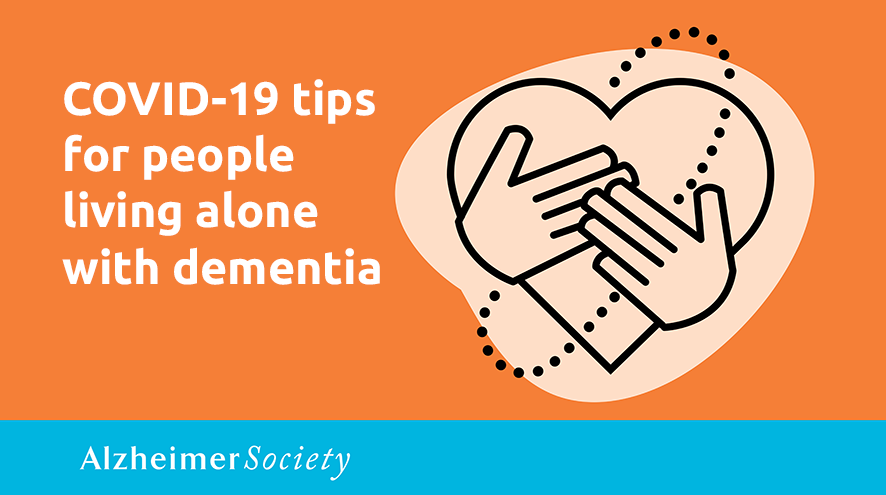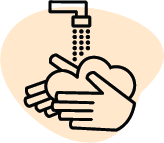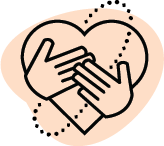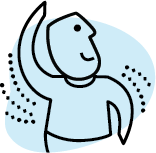COVID-19 tips for people living alone with dementia

Wash your hands

- Try these handwashing tips:
-
- Post reminders in key locations, like by the front door so it’s the first thing you see when you arrive home.
- Set a regular reminder to wash your hands using your computer, phone or alarm clock.
- Print and follow the handwashing guidelines.
- Set a timer or sing a song for at least 20 seconds while you wash your hands.
- Create a tracking system to help you remember when you last washed your hands.
- Make it a habit to wash your hands every time you return home after being outside.
Here are more helpful resources with memory tips and tricks:
- Limit how often you touch your face:
-
- Keep your hands busy with activities, like hobbies or chores.
- Do your best to limit how often you touch your face but accept that it will happen. Make it a habit to practice proper handwashing techniques.
Take care of yourself

- Practice healthy habits:
-
- Stay physically active. Use websites like YouTube to find free videos of guided at-home exercises that you can try indoors or in your backyard.
- Eat healthily. You can get healthy grocery items delivered to your home if you are unable to go to the grocery store. Or, you can ask your friends, family or neighbours to get groceries for you.
- Connect with others. Schedule regular check-ins with a family member or friend.
- Take time to de-stress. Try stretching, yoga, meditating or taking deep breaths.
- Get your sleep. Do your best to keep a regular sleeping schedule.
- Be mindful of the coping strategies you use. Try to avoid unhealthy or excessive coping strategies like alcohol or drug use, smoking, binge eating, online shopping, etc. Seek support if you feel you need it.
- Other self-care considerations during COVID-19:
-
- Limit your news consumption to one or two trusted sources. Check your trusted news sources once in the morning and once in the evening.
- Try to maintain a routine. Connect with your local Alzheimer Society to find out how they are adapting their programs and services.
- Think about what makes you happy. Keep a special comfort item like a blanket nearby, prepare a cup of tea in the morning, or break out your favourite at-home activity.
- Learn something new. Start a new hobby or watch YouTube videos on interesting topics.
- Take things day by day.
- Focus on the positive, like how people are coming together to support each other during this time. Look for examples of this in your own community.
Here are more helpful resources about COVID-19, dementia and mental health:
- If you are using technology to stay connected to others, remember:
-
Beware of scams. If you receive a suspicious message on social media, please report it. If you suspect an email is spam, ignore it and delete it. Do not click on any links or open any attachments, especially if these are unsolicited or use any kind of urgent language. If you are in doubt about whether something is legitimate, ask someone you trust. Report any suspicious websites or requests to the Canadian Anti-Fraud Centre.
Here are some helpful resources with technology instructions:
- Virtual visits toolkit (with information on using Zoom and Skype).
- Making video calls with FaceTime
Stay active at home

- Some examples of activities you could try at home include:
-
- Gentle exercises
- Watching your favourite tv shows or movies
- Listening to the radio, music, a podcast, or an audiobook
- Colouring
- Calling a friend or family member
- Puzzles
- Crafts
- Gardening (inside or outside)
- Reading
- Baking
- Playing cards
- You can also try:
-
- Connecting with your local Alzheimer Society for more activity ideas.
- Doing some of these activities online or over the phone with a friend or family member.
- Researching whether activities you would normally do are being offered online. Virtual museum, zoo and national park visits are some of the options available! For example, you can:
- Watch the shark camera at Ripley's Aquarium of Canada
- Take a tour at the Virtual Museum
Here are helpful resources with instructions for using technology to stay connected:
- Virtual visits toolkit (for tips on using Zoom and Skype).
- Making video calls with FaceTime
Stay connected

- Practice physical distancing:
-
- Arrange for groceries, medications and other necessary supplies to be delivered to your home.
- Stay connected with family, friends and neighbours. Now is a good time to use technology to stay in touch. Try using FaceTime, Skype, or Zoom.
- Follow public health guidelines around physical distancing.
Here are more helpful resources about practicing physical distancing without becoming socially isolated:
- Coronavirus (COVID-19): Tips for people with dementia, caregivers and families
- Physical distancing fact sheet
- Social distancing YES, social isolation NO
Here are helpful resources with instructions for using technology to stay connected:
- Virtual visits toolkit (for tips on using Zoom and Skype).
- Making video calls with FaceTime
Know what to do if you get COVID-19

- Stay calm and plan ahead:
-
- Make a list of important numbers and display it somewhere prominent, like your fridge. Include the numbers of your local public health unit, your healthcare provider, your local Alzheimer Society and emergency contacts.
- Ensure that you have enough household supplies and medications on hand for two weeks.
- Ask family members, friends and/or neighbours to help if you become ill.
- Have a back-up plan for if you become ill. Document detailed instructions for care. List the medications you are taking and how often you have to take them.
- Prepare a bag with essentials in case you need to go to the hospital (e.g. a set of clothes, personal care items, emergency contact information, important medical information like what medications you are taking, instructions that outline your advanced care wishes).
Click the link below to view a helpful resource about how to prepare for an emergency department visit:
- What to do if you suspect that you have COVID-19:
-
- Contact your healthcare provider or local public health agency for guidance. Call ahead to tell them about your symptoms and follow their instructions for next steps.
- Self-isolate for 14 days.
- Disinfect any shared spaces after you use them. Post reminders to do so around your home.
- Ask family members, friends and/or neighbours if they can help support you. Have a detailed care plan ready.
Here are more helpful resources about managing COVID-19:
Your local Alzheimer Society can help you and your family through this pandemic. Contact your local Society for further information and support.

